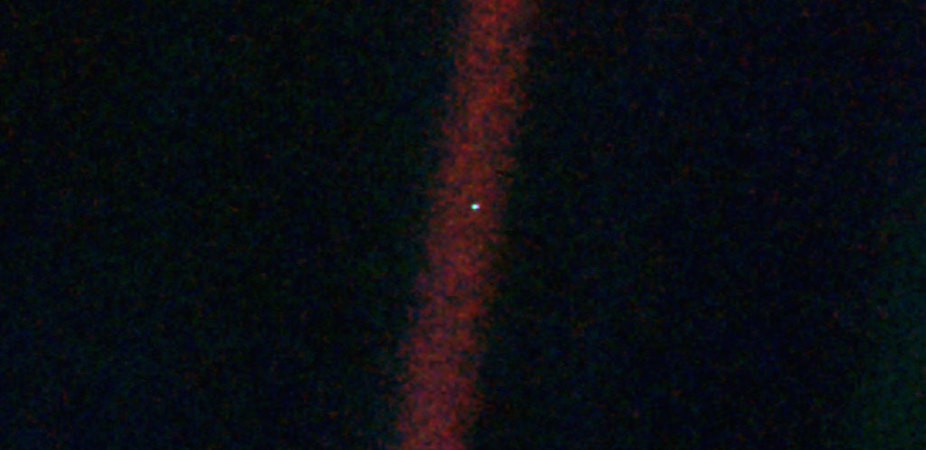Space Selfie - people, robots, planets and the universe

Photo from the Voyager 1 probe from a distance of 6 billion kilometers
February 14, 1990, when Voyager-1 orbit Pluto, he made the last pictures of the planet Earth. They were transferred to the MCC only in May of 1990. The journey of the electrical signal from the probe to the Earth took 5.5 hours.
The photo was combined from three pictures taken in blue, green and purple colors. As a result, the famous “Pale Blue Dot” photograph was taken, depicting our small and fragile planet on the scale of the Solar System.

Family album of our system
')
Voyager-1 made not only a photograph of Earth - he created a whole family photo album of the planets of the system. The famous astronomer Carl Sagan even before the Voyager mission expressed his ideas about creating such a photo album. In his book “Pale Blue Dot. Possible future of man in space "he wrote:
Our posturing, our far-fetched self-conceit, the illusion that we are in some privileged position in the Universe - all this is called into question at the sight of this pale point.
Other planet selfies
This was not the first selfie of the Earth, which she made with the help of her inhabitants. In 1968, astronauts from the Apollo 8 mission took several pictures from the lunar orbit of the ascending Earth. The planet from here seems small and the details on it are not distinguishable, unlike the large lunar craters, which emphasize the distance of the astronauts from the house.
The video recreates the conditions in which the pictures were taken.
These astronauts were also the first people who took a picture of the entire planet. One of the mission participants, Jim Lovel, commented on the possible position of an alien who saw the Earth for the first time:
I imagine everything as if I am a lone traveler from another planet, and what would I think about the Earth, seeing it from this distance, and whether I would think about whether it is inhabited or not ... I guess it would be more interesting to land me on the brown or blue part of it.
In December 1972, the Apollo 17 mission took another well-known photograph of the planet from a distance of 45,000 kilometers, which was soon dubbed "blue marble."

Selfies of humans and robots
The first man in outer space was Alexey Leonov on March 18, 1965.

And the first "selfie" was made by Edwin "Buzz" Aldrin in 1966.

In 2013, the Curiosity rover took 66 photographs of which its own portrait was made.

For my own comfort, I always remember the diagram " The position of the Earth in space ." I printed it and hung it on the wall - every time when I am overcome by problems, I look at it and realize their true size.
Future
Voyager 1 is now at a distance of 19 billion kilometers from us, and is believed to have left the solar system and travels in interstellar space. From this distance, our planet cannot be photographed with its cameras. He moves toward the constellation Ophiuchi. In about 40272, it will fly up to a distance of 1.7 light years to a star from the constellation Ursa Minor.
No one knows how the world will change with time. Has the world changed the appearance of photographs of a small and fragile planet as it appears from the lunar orbit? Or photos of a pale blue point, indistinguishable from other planets of our system?
Well-known naturalist John Muir wrote a hundred years ago in his book Travels in Alaska:
When we perceive the entire planet as one giant drop of dew, decorated with continents and islands, flying in outer space along with other stars that sing and shine together - the Universe seems like an endless storm of beauty.
Are we worthy to be a crew of this space ship, walking through a stormy, but beautiful universe?
Articles on a similar subject
Stunning photographs of Earth and space with a camera for £ 56 - nowadays almost everyone can take a picture of the planet from above. Let not so beautiful, as with the ISS, but yours.
Photos of the Earth with the ISS from astronaut Terry Werts - but with the ISS more beautiful
Earth from space: 15 amazing things in 15 years - many beautiful pictures
150 years of the most famous of the first photos of the Moon. Edit - and while we could not tear ourselves away from the surface of the planet, we photographed what was visible from it.
The article is based on the material "The Selfies" of Earth .
Source: https://habr.com/ru/post/365351/
All Articles